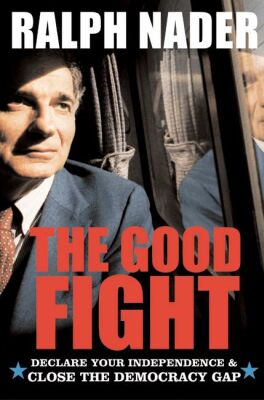

| THE GOOD FIGHT: Declare Your Independence & Close the Democracy Gap Ralph Nader New York: ReganBooks, 2004 |
Rating: 4.5 High |
|||
| ISBN-13 978-0-06-075604-8 | ||||
| ISBN 0-06-075604-7 | 294p. | HC | $25.95 | |
Ralph Nader (1934- ): Born in Connecticut of immigrant parents. Magna Cum Laude graduate of the Woodrow Wilson School of International Affairs at Princeton University. Honors graduate of Harvard Law School. This brief biography summarizes his career and shows why he is the pre-eminent advocate for the consumer and the general public. He acquired that status the old-fashioned way: He earned it. Both in effectiveness and in longevity, his career is remarkable. His performance as presidential candidate, however, is another story. I think it is warranted, therefore, to ask, in both senses, "What makes Nader run?"
As I note in my review, despite John Kerry having won his three debates with George Bush (Nader did not take part), Bush is ahead in the polls. It is part of a persistent pattern in this country: Politicians promise great things to the people, then wind up making short-sighted decisions that benefit mainly the corporations which contribute massive chunks of cash to their campaigns. Those corporations also lobby the Congress incessantly for favorable legislation — while the majority of the public goes meekly along with its own disadvantaging. Ralph Nader understands this. I believe what that understanding causes him to feel can be expressed in a single word: outrage. I believe that outrage is what has kept him going these many years, fighting the good fight, trying against all odds to get the slumbering electorate to wake up and make just the modicum of effort required to turn the political process to its benefit.
![[Rant Warning]](../../../../RantWarn.gif)
| Workplace-related accident and disease | 58,000 |
| Air pollution | 64,000 |
| Medical malpractice during routine hospital care | 80,000 |
| Inability to pay for health care | 18,000 |
| Adverse effects of prescribed drugs | 100,000 |
| Motor vehicle accidents | 42,000 |
| Total preventable deaths | 362,000 |
| Environmental pollution | $307,800,000,000 |
| Deceptive business practices | $1,160,000,000,000 |
| Defense procurement overruns | $25,900,000,000 |
| Workplace accidents | $141,600,000,000 |
| Workplace cancers | $274,700,000,000 |
| Unsafe motor vehicles | $135,800,000,000 |
| Total externalized costs1 | $3,000,000,000,000 |
The rant above reflects Nader's concerns. This one is mine.
![[Rant Warning]](../../../../RantWarn.gif)
There is much to admire about Nader: His accomplishments on behalf of consumers are legendary. So is the dedication he brings to the fight; he has not flagged for forty years. He is tireless in pursuing those who rip off the consumer, skilled at uncovering their depredations, clear and forceful in describing them to the public. But, in the final analysis, I regretfully conclude that he has become a marginal figure. The passion that drives him to such worthy efforts also makes him too intense to connect easily with the people he is determined to educate.
The presidential campaign of 2004 is unusual only in the sharp differences between the two leading contenders. What has not changed is the huge cost of such campaigns and the extent to which contributions from various "special interests" (read: big business) determine the outcome. It is part of a persistent pattern in this country: Politicians promise great things to the people, then wind up making short-sighted decisions that benefit mainly the corporations. George Bush is exceptional merely because he's done more of this than most. Ralph Nader understands a simple truth: that putting the public good first is not only morally right, but also the best thing for the bottom line — certainly in the long run, and probably in the short run as well. The fact that most members of the electorate don't understand this, that they can be hoodwinked time and again, that they fail to put forth even a modicum of effort to influence the political process to their benefit, is something about which I share Nader's outrage. I yield to no one in honoring his long battle for the public good. I respect his intention to bring this issue of overweening "corporatocracy" before the public during a presidential campaign. But I wish he had taken another course than becoming a candidate himself — for I fear he will in the end only succeed in diverting some of the votes that might have gone to Kerry, thereby assuring victory by Bush. Though Nader denies it, this is what happened in the 2000 election. Perhaps the best thing Nader could do now is to withdraw from the election and then turn his attention to setting up some institution that would carry on his important legacy of advocacy.

 To contact Chris Winter, send email to this address.
To contact Chris Winter, send email to this address.